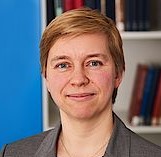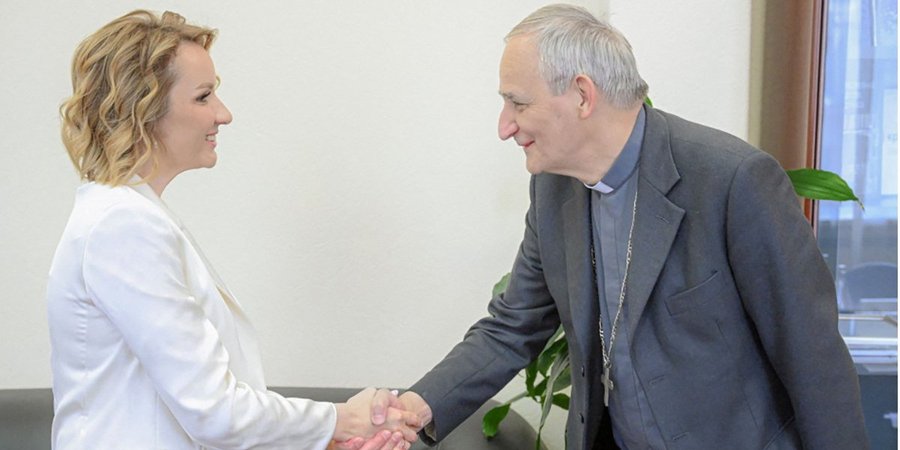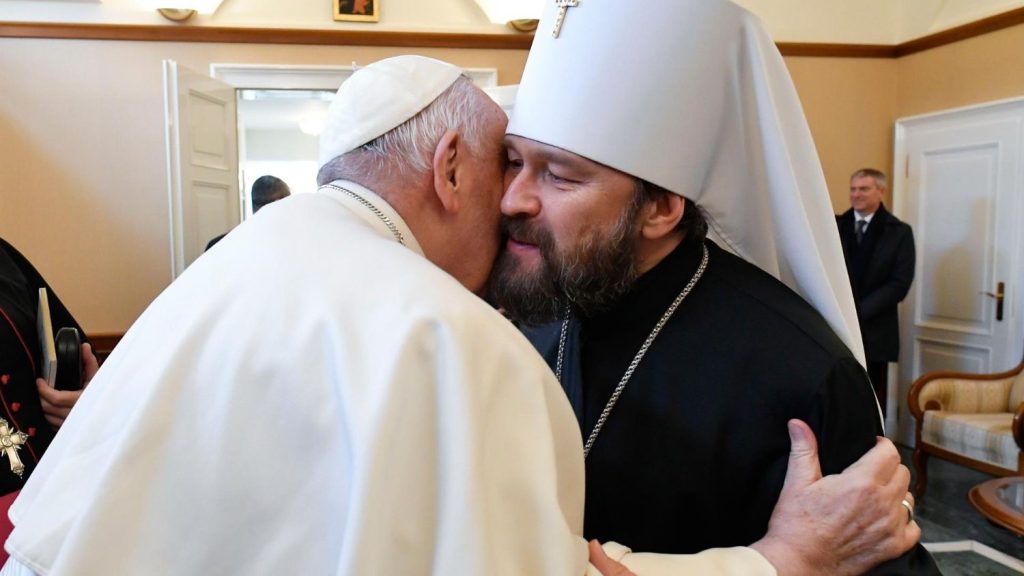
Regina Elsner is an appointed professor of Eastern Churches and Ecumenical Theology at the Catholic-Theological Faculty at the University of Münster.
After one and a half years, the diplomatic efforts in Russia’s war against Ukraine have caused major global disillusionments—no means, strategy, or peace plan has yet brought a truly viable end to the war closer or opened options for a just peace in the region. This includes the Vatican’s multiple diplomatic initiatives. In its dual role as an actor in the community of states and as the center of one of the world’s largest religious communities, the Vatican has ways of maintaining a conversation with warring parties where many other actors can no longer gain access. This position has raised the hope that the Vatican, particularly the Pope, can play a mediating role in Russia’s war.
At the World Youth Day in Lisbon in August 2023, Pope Francis apologized for his “helplessness” toward Ukrainian youth. Cardinal Matteo Zuppi had a few days earlier reclassified his “peace mission” commissioned by the Pope as a “humanitarian mission” after visits to Kyiv, Moscow, and Washington. This comes primarily as a reaction to the obviously sobering visit to Moscow. The price for this realization was high. Previously, the Vatican media had taken over, without comment, the Russian propaganda pictures of Zuppi’s friendly meeting with Maria Lvova-Belova, who is internationally charged as a war criminal for the deportation of Ukrainian children.

In many ways, the very dual role of the Vatican—as spiritual and political actor—on which so many had pinned their hopes has become the greatest obstacle to a credible and effective mediating role in the Russian war. In addition to a misperception of political and social realities in Russia that has persisted for three decades (and which the Church shares with many other international political and civil actors), two hypotheses have proven false in the case of the Russian war: that politics and religion (or the Church) can be separated for the sake of communication, and that the Vatican is a neutral actor in this war.
Playing the Innocent Between Politics and Religion
The fluid boundaries between politics and church are inscribed in the Vatican’s dual function as a state-legal and spiritual actor. With an appropriate theological, political-ethical reflection on this interplay, the synergies and dangers that arise from it can be grasped and exploited. The largely secular paradigms of political international relations call for a restrained use of religious arguments and legitimations. However, where religious arguments are explicitly part of a state policy, a state like the Vatican may find a more successful approach than strictly secular actors—provided that its religious authority is recognized.
The Vatican’s current relationship with Russia has been significantly shaped by its relations with the Soviet Union during the Cold War. The Soviet Union deployed a strategy to soften the boundaries between politics and religion, which corresponded to the Vatican’s dual nature. Ecumenical networks became important platforms for mutual political influence, and the Christian peace movement, in particular, carried clear political messages. It could have been a conscious choice for a new political theology (which also developed in these times, but in other settings); however, the religious actors—the Vatican and the representatives of the Russian Orthodox Church who also performed as political ambassadors of their state—emphasized their apolitical, purely religious position and thus tried to detach themselves from direct political responsibility.
After the end of the Soviet Union, this Cold War approach to religious diplomacy remained a guiding force in several respects. The Russian Orthodox Church felt fundamentally freed from state instrumentalization. Accordingly, many international ecumenical relations now focused primarily on dogmatic issues, especially ecclesiology. The so-called social-ethical issues—peace, social justice, human rights, and the like—receded into the background. Politically, the ROC welcomed the now-declared democratic separation of religion and politics in Russia and the other post-Soviet states. At the same time, however, it claimed to be an existential factor in the cultural identity of all the countries of the former Rus’—that is, Belarus and Ukraine in addition to Russia—and thus to have privileged (and exclusive in terms of the Orthodox world) access to the countries’ educational, cultural, and domestic policies.

Domestically, the ROC has often evaded accusations of playing politics by referring to its purely religious claims on the people. However, these religious claims always aimed at civilizational decisions, meaning political and legal decisions of the state. Simultaneously, in ecumenical conversation, the ROC dismissed issues such as the universal claim of human rights as political interference in religious or cultural affairs, and theological developments such as the recognition of women in ordained ministry or same-sex partnerships as accommodation to political will.
The strategy of immunizing itself as a political actor against criticism by referring to “purely religious” issues is now having a particularly devastating effect in the Russia-Ukraine war. Pope Francis, his appointee Cardinal Zuppi, and other Vatican diplomats are trying to reach out on a religious level to the ROC, Patriarch Kirill, Metropolitan Hilarion, and Metropolitan Antony (Hilarion’s successor in the foreign office); they (Kirill, Ilarion, and Antony) are well-known and long-standing partners and Vatican officials reach out to them not as diplomats of their church or country, but as religious people which they know for a long time.

For their ROC counterparts, however, the religious language was a cover for political strategies for many years. Pope Francis’ words “we cannot use the language of politics, but that of Jesus” thus gives the floor to the ROC’s immunization that as a church it has nothing to do with the dirty business of war and Russian imperialistic sentimentsas its pre-condition, but is just telling religious truth and praying for peace. The ROC values the commitment of the Vatican to this depoliticization deeply. As a political actor, however, the Vatican must admit to representing no authority whatsoever for Russia’s political regime, but merely a useful aide in the worldwide blurring of the distinction between attacker and attacked, perpetrators and victims in this war. Rather than draw them into a peacemaking process, the Vatican approach strengthens both Putin’s regime and the ROC as war-conducting actors.
Neutrality in ideology?
The Vatican has become a useful aide to the ROC’s strategy, mainly thanks to its ostensible neutrality, which prohibits it from pronouncing clear judgments on who is to blame for the war. This neutrality is a much-praised feature of Vatican diplomacy, as it is supposed to make it possible to talk to all involved parties, no matter how hardened the conflict. The official, largely silent attitude of Pius XII toward Hitler’s regime in World War II is frequency cited as a comparison to the present Vatican’s neutrality. However, the Cold War is a more helpful comparison here. As Piotr H. Kosicki shows in his recent contribution “No neutrality in ideology”, it is in the second half of the 20th century that the Vatican complemented its political and legal neutrality with an ideological partisanship—namely, a clear anti-communist stance expressed in its commitment to human rights, for example, during the Helsinki process.
This legacy of the Vatican’s Ostpolitik plays a crucial role in current mediation efforts between Russia and Ukraine, although in an unexpected way. In particular, anti-communism moved Pope John Paul II to be very cautious in his dealings with Russia and the ROC, neither of which has gone through any kind of decommunization. This attitude is alien to Pope Francis, who is influenced by a leftist South American liberation theology and a deep skepticism toward the United States. For the Pope, as it is for many societies in the global South, the experience of U.S. (neo)colonialism is a far greater terror than Russia, whose cultural imperialism and colonialism towards its neighbors and non-Russian population inside Russia remains unknown and unrecognized as a real threat. The latest speech of Pope Francis to the Russian Catholic youth about the heritage of “great Russian history” is a vocal reminder to this blind spot in the Vatican discourse.
The end of ideological blocs has also led to the Vatican’s blindness to new ideological borders and, crucially, to its own ideological partisanships. Vatican anti-communism was an officially declared guiding idea even before World War II, and only by this conscious and public decision could this ideological partisanship be combined with legal neutrality and consciously implemented in the search for peace-promoting compromises. Russia’s current war is by no means free of ideology, but follows the logic of the often described culture wars between the liberal and the so-called conservative social order. The largest institutional representative of this logic is the Russian Orthodox Church. The latter, however, has consolidated the concept of salvific resistance to liberalism for three decades in close cooperation with the Vatican. The cooperation of the ROC and the Vatican to strengthen so-called traditional values, the fight against secularization and “gender ideology”—ironically often marked as new Marxism—was described as a “strategic alliance” by Metropolitan Hilarion back in 2011. This alliance, at least for the Russian side, is an organic part of the “metaphysical struggle” that Patriarch Kirill announced in March 2022 to legitimize the killings in Ukraine.
The Pope, on the other hand, has yet to reflect in any way on this entanglement of his church in the ideology that continues to feed this war eighteen months later. The same can be said of other representatives of the Catholic Church who are or have been in diplomatic or ecumenical contact with the ROC. But then, can there be a legal neutrality with an unspoken or even unconscious ideological partiality with the side of the aggressor? Can there be a compromise, or even a lasting and just peace as long as the ideology behind the war is not on the table? Given the global and partly violent right-wing backlash on human rights and liberal democracy with significant support of Catholic actors and the ROC, to engage with its own non-neutrality in ideology might be the most burning issue for Vatican diplomacy in the moment—and a crucial lesson from the unsuccessful peace mission in Russia’s war in Ukraine.
